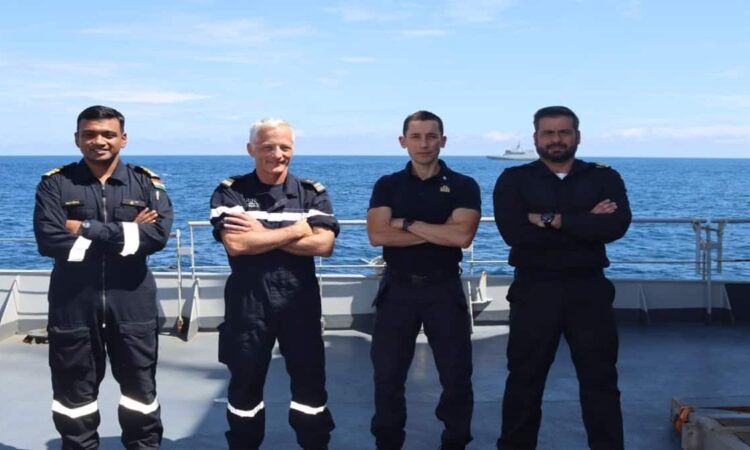
For the first time the European Union (EU) and India joined forces for their inaugural naval exercise in the Gulf of Guinea earlier this week (oct 24, 2023).
This exercise was the culmination of collaborative efforts that transpired following the third meeting of the EU-India
Participating in this remarkable exercise were four ships: the Indian Navy’s INS Sumedha, an Offshore Patrol Vessel, along with Italian Navy Ship ITS Foscari, French Navy Ship FS Ventôse, and Spanish Navy Ship Tornado from EU Member States. Together, they engaged in a series of tactical manoeuvres in international waters off the coast of Ghana. These manoeuvres included a boarding exercise, a flying exercise that utilized helicopters embarked on the French Ship Ventôse and the Indian Naval Ship Sumedha, and the transfer of personnel between ships.
The collaborative spirit extended beyond the naval exercises, as a knowledge sharing session took place in Accra, Ghana. This session leveraged the joint experience at sea to enhance operational knowledge and foster stronger ties between Ghanaian officials and representatives from India, the EU, and EU Member States missions to Ghana.
These combined efforts underlined the shared dedication of India and the EU to support coastal states and the Yaoundé Architecture in their mission to ensure maritime security in the Gulf of Guinea. This collaborative endeavour reflected the breadth and dynamism of EU-India cooperation on maritime security, signalling their mutual commitment to uphold the United Nations Convention on the Law of the Sea (UNCLOS).
EU-India Maritime Security Dialogue
The third India-EU Maritime Security Dialogue, held on October 5, 2023, in Brussels, Ms Muanpuii Saiawi, Joint Secretary for Disarmament & International Security Affairs at the Ministry of External Affairs, led the Indian delegation. The EU delegation, headed by Ambassador (Ms) Joanneke Balfoort, Director for Security and Defence Policy at the European External Action Service, engaged in productive discussions. Their conversations revolved around ways to maintain a secure maritime environment that promotes inclusive growth and global well-being.
During the dialogue, the two sides reviewed ongoing cooperation initiatives in the maritime domain and explored avenues to strengthen international and regional mechanisms for comprehensive maritime security. They delved into areas of shared interest, such as countering illicit maritime activities (IMA), maritime law enforcement, and capability building. Additionally, they discussed cooperation in the enhancement of maritime domain awareness (MDA) and looked forward to future India-EU maritime engagements.
Yaoundé architecture
This collaborative effort finds its roots in the Yaoundé Summit of June 2013, where leaders from the Economic Community of West African States (ECOWAS), the Economic Community of Central African States (ECCAS), and the Gulf of Guinea Commission (GGC) gathered in Yaoundé, Cameroon. This historic summit laid the foundation for a common regional strategy to prevent and prosecute illicit activities in the Gulf of Guinea, resulting in the creation of the Yaoundé Code of Conduct, the Heads of States Declaration, and the Memorandum of Understanding between regional organizations.
The Yaoundé Architecture comprises the Interregional Coordination Centre (ICC), which acts as the coordination and information-sharing hub connecting the Regional Maritime Security Centre for Central Africa (CRESMAC) and the Regional Maritime Security Centre for West Africa (CRESMAO). In addition, the coastal space is divided into five operational maritime zones, each coordinated by Maritime Multinational Coordination Centres (MMCC). At the national level, Maritime Operational Centres (MOC) in each country gather key stakeholders involved in state actions at sea, including maritime police, customs, fisheries, and environmental protection, along with national navies responsible for coordination.
The EU-India joint naval exercise in the Gulf of Guinea marks a significant milestone in their commitment to maritime security and collaboration in the region, building upon the foundation of the Yaoundé Architecture. This cooperation not only strengthens maritime security but also bolsters international partnerships for the greater well-being of the global community.





